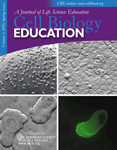Students' Motivations for Data Handling Choices and Behaviors: Their Explanations of Performance
Abstract
Cries for increased accountability through additional assessment are heard throughout the educational arena. However, as demonstrated in this study, to make a valid assessment of teaching and learning effectiveness, educators must determine not only what students do, but also why they do it, as the latter significantly affects the former. This study describes and analyzes 14- to 16-year-old students' explanations for their choices and performances during science data handling tasks. The study draws heavily on case-study methods for the purpose of seeking an in-depth understanding of classroom processes in an English comprehensive school. During semistructured scheduled and impromptu interviews, students were asked to describe, explain, and justify the work they did with data during their science classes. These student explanations fall within six categories, labeled 1) implementing correct procedures, 2) following instructions, 3) earning marks, 4) doing what is easy, 5) acting automatically, and 6) working within limits. Each category is associated with distinct outcomes for learning and assessment, with some motivations resulting in inflated performances while others mean that learning was underrepresented. These findings illuminate the complexity of student academic choices and behaviors as mediated by an array of motivations, casting doubt on the current understanding of student performance.



